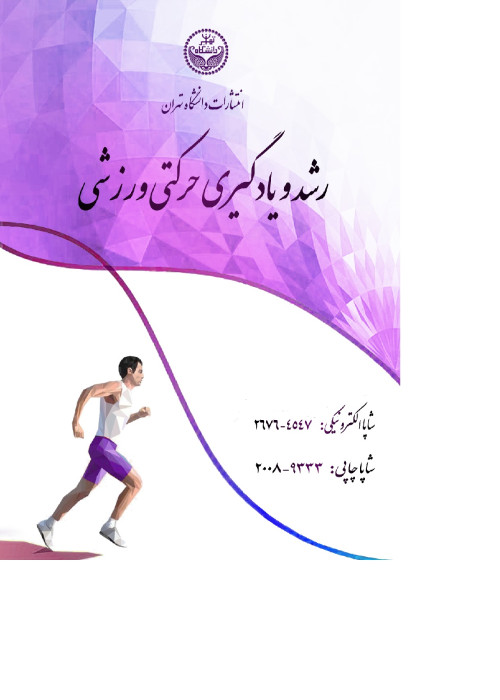Developmental Differences in Motor Sequence Learning: Task Learning Approach Based on Motor Development
Author(s):
Abstract:
Learning motor tasks is one of the fundamental attributes of mankind''s experiences and is a collection of sensitive، cognitive and motor processes. Many of complex motor behaviors are performed based on a type of order or sequence. In the present study، the developmental differences in motor sequence learning were examined in three groups of children (age range 7،8،10 yr) and one control group of adults. For this purpose، the professional software of sequential stimuli، time record and response error was designed in C++. 48 right-handed participants (3 groups of 12 children and 1 group of 12 adults) who were healthy in their nervous system and had no prior experience of the mentioned task participated in this study. The intervention included 10 stages (8 stages for acquisition and 2 stages for retention). Performance was assessed by examining changes in accuracy and response coordination. The data were analyzed with factor analysis of variance and Kolmogorov-Smirnov test. The results showed a developmental progression in motor sequence learning in all groups. Interestingly، different developmental trajectories were observed in response accuracy and coordination. There was a significant difference in response accuracy between 7،8-year-old groups and adults and 10-year-old groups in the acquisition phase but no significant difference was observed between adults and 10-year-old-group. For response coordination، adults responded to the stimuli more synchronously than all children and 10-year-old group responded more quickly than 6-year-old group. In the retention test، for response accuracy، 10-year-old group''s performance was similar to adults and for response coordination، adults performed more synchronously than all groups but 7-year-old group had a delay in response coordination compared to the other groups. Overall، the differences observed in response accuracy and coordination was consistent with the hypothesis that accuracy may rely on cortical pathways that show their greatest maturation between ages of 7 and 10 whereas coordination may rely on subcortical pathways that continue to develop into young adulthood. The findings suggested that in one hand، various aspects of motor development influence motor learning and on the other hand during the learning of different components of a task، parameters that are more difficult with regard to motor control (for example response coordination) are acquired and maintained in a longer process.
Keywords:
Language:
Persian
Published:
Journal of Sports and Motor Development and Learning, Volume:5 Issue: 13, 2013
Pages:
79 to 102
magiran.com/p1158391
دانلود و مطالعه متن این مقاله با یکی از روشهای زیر امکان پذیر است:
اشتراک شخصی
با عضویت و پرداخت آنلاین حق اشتراک یکساله به مبلغ 1,390,000ريال میتوانید 70 عنوان مطلب دانلود کنید!
اشتراک سازمانی
به کتابخانه دانشگاه یا محل کار خود پیشنهاد کنید تا اشتراک سازمانی این پایگاه را برای دسترسی نامحدود همه کاربران به متن مطالب تهیه نمایند!
توجه!
- حق عضویت دریافتی صرف حمایت از نشریات عضو و نگهداری، تکمیل و توسعه مگیران میشود.
- پرداخت حق اشتراک و دانلود مقالات اجازه بازنشر آن در سایر رسانههای چاپی و دیجیتال را به کاربر نمیدهد.
In order to view content subscription is required
Personal subscription
Subscribe magiran.com for 70 € euros via PayPal and download 70 articles during a year.
Organization subscription
Please contact us to subscribe your university or library for unlimited access!


